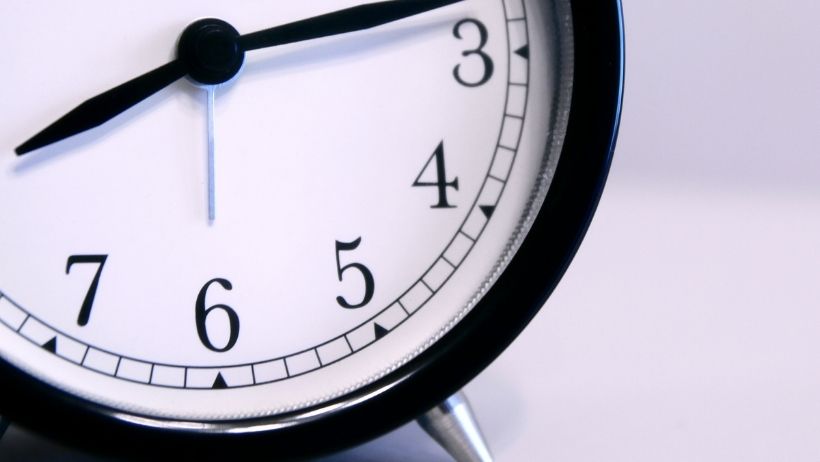Mengapa produktivitas pada waktu yang berbeda dalam sehari sangat berbeda?
Banyak orang beranggapan bahwa waktu terbaik untuk belajar adalah saat mereka dalam kondisi paling waspada. Beberapa penelitian menunjukkan bahwa siswa memiliki sesi belajar yang paling produktif dan fokus selama waktu ini.
Namun, jika Anda pernah mencoba memaksakan diri untuk fokus pada pukul 5 pagi atau di tengah-tengah jamuan makan malam (maaf atas kehilangan Anda), Anda tahu bahwa hal itu tidak selalu mudah. Mengapa produktivitas pada waktu yang berbeda dalam sehari sangat bervariasi?
Alasannya adalah hormon! Produksi hormon bervariasi sepanjang hari, serta selama musim dan waktu dalam setahun—dan hormon-hormon ini memengaruhi perasaan kita terhadap hal-hal seperti makanan atau rasa kantuk serta seberapa banyak energi yang kita miliki untuk melakukan aktivitas seperti belajar.
Apa hubungannya siklus tidur dengan apa pun?
- Siklus tidur berlangsung selama 90-110 menit.
- Tubuh Anda melalui 5 siklus tidur setiap malam, dimulai dengan tidur paling ringan dan berakhir dengan tidur paling nyenyak.
- Selama siklus pertama di malam hari, Anda akan tidur ringan; selama siklus terakhir, Anda akan tidur nyenyak. Jika tubuh Anda tidak melalui semua 4 hingga 5 siklusnya per malam, hal itu dapat memengaruhi daya ingat dan kemampuan belajar Anda di siang hari (karena proses ini terjadi saat seseorang tidak sadar).
Apa itu ritme sirkadian?
Ketika Anda memikirkan ritme sirkadian, Anda mungkin menganggapnya sebagai waktu di siang hari saat Anda merasa paling berenergi dan produktif. Namun, ada empat tahap yang membentuk ritme sirkadian Anda:
- Bangun (dari tidur atau rasa kantuk)
- Morningness (antara terjaga dan merasa mengantuk lagi)
- Puncak kewaspadaan (periode aktivitas mental tertinggi selama siklus ini; biasanya antara pukul 9 pagi dan siang hari)
- Penurunan pada sore/malam hari (penurunan kinerja mental sekitar pukul 3 sore hingga pukul 6 sore).
Mengapa gen Anda peduli dengan zona waktu?
Jam biologis adalah sistem kompleks yang memengaruhi ritme 24 jam dari banyak sistem vital dalam tubuh Anda. Ritme ini juga disebut ritme sirkadian, yang berarti "sekitar satu hari" dalam bahasa Latin. Ritme ini dikendalikan oleh jam biologis internal yang terletak jauh di dalam otak Anda dan menentukan kapan Anda merasa mengantuk, lapar, atau terjaga.
Sel-sel dalam tubuh juga memiliki jamnya sendiri—mereka mengendalikan segala macam fungsi mulai dari pencernaan hingga pengaturan suhu hingga tekanan darah.
Gen mengendalikan ritme sirkadian—dan dipengaruhi oleh zona waktu! Mekanisme genetik yang mengendalikan jam biologis kita sensitif terhadap paparan cahaya di malam hari atau siang hari (itulah sebabnya Anda mungkin merasa kurang mengantuk di hari yang mendung).
Apakah ada faktor lain yang memengaruhi produktivitas saya sepanjang hari?
Meskipun kami menemukan bahwa ada hubungan umum antara waktu dan produktivitas, ada faktor lain yang juga dapat memengaruhi produktivitas Anda. Studi menunjukkan bahwa orang muda cenderung lebih produktif di pagi hari, sementara orang tua cenderung lebih produktif di malam hari. Tingkat energi Anda juga dapat memengaruhi kemampuan Anda untuk berkonsentrasi saat belajar di waktu yang berbeda dalam sehari: jika Anda merasa energi Anda rendah, Anda akan kurang produktif dibandingkan jika Anda merasa energi Anda tinggi. Selain itu, jika tingkat stres Anda tinggi atau rendah pada titik tertentu sepanjang hari (diukur dengan variabilitas denyut jantung), hal ini juga dapat memengaruhi tingkat konsentrasi Anda saat tiba waktunya untuk sekolah atau waktu belajar.
Bagaimana jadwal saya harus berubah saat bepergian ke lokasi baru?
Saat bepergian, ada beberapa faktor yang perlu dipertimbangkan saat merencanakan jadwal belajar Anda:
- Berapa banyak zona waktu yang Anda kunjungi? Jika Anda terbang dari New York City ke Los Angeles selama satu minggu, akan lebih sulit bagi tubuh Anda untuk menyesuaikan diri dibandingkan jika perbedaannya hanya satu jam.
- Berapa lama Anda akan menginap? Jika ini adalah perjalanan singkat dengan sedikit waktu istirahat di antara penerbangan, hal ini mungkin tidak terlalu penting. Namun, jika ini adalah perjalanan panjang dengan lebih banyak waktu istirahat di antara penerbangan dan/atau hari-hari di kota tujuan sebelum atau setelah penerbangan (misalnya jika saya pergi ke tempat yang hangat), mungkin penting bagi saya untuk tetap terjaga selama periode ini sehingga tubuh saya dapat beradaptasi lebih baik sebelum tidur dan bangun dengan perasaan segar di pagi hari.
- Berapa lama jet lag akan berlangsung? Butuh waktu sekitar tiga hari sebelum tubuh saya benar-benar beradaptasi lagi setelah kami mendarat kembali di rumah setelah perjalanan lintas negara melalui California dan Nevada musim panas lalu—dan bahkan saat itu saya masih merasa lelah di beberapa pagi hingga waktu makan siang karena kami tidak tidur nyenyak saat berkendara melewati beberapa negara bagian!
Waktu dalam sehari di mana Anda paling produktif berubah sesuai dengan siklus tidur dan ritme sirkadian Anda.
Waktu dalam sehari di mana Anda paling produktif dan waktu terbaik untuk belajar berubah sesuai dengan siklus tidur dan ritme sirkadian Anda.
- Ritme sirkadian adalah jam internal yang memberi tahu kita kapan kita harus bangun, tidur, atau lelah. Ritme ini diatur oleh bagian otak yang disebut nukleus suprachiasmatik (SCN).
- SCN dipengaruhi oleh faktor-faktor seperti cahaya dan suhu yang memengaruhi ritme sirkadian kita.
Bagaimana Saya Dapat Membuat Area Belajar Saya Lebih Produktif?








